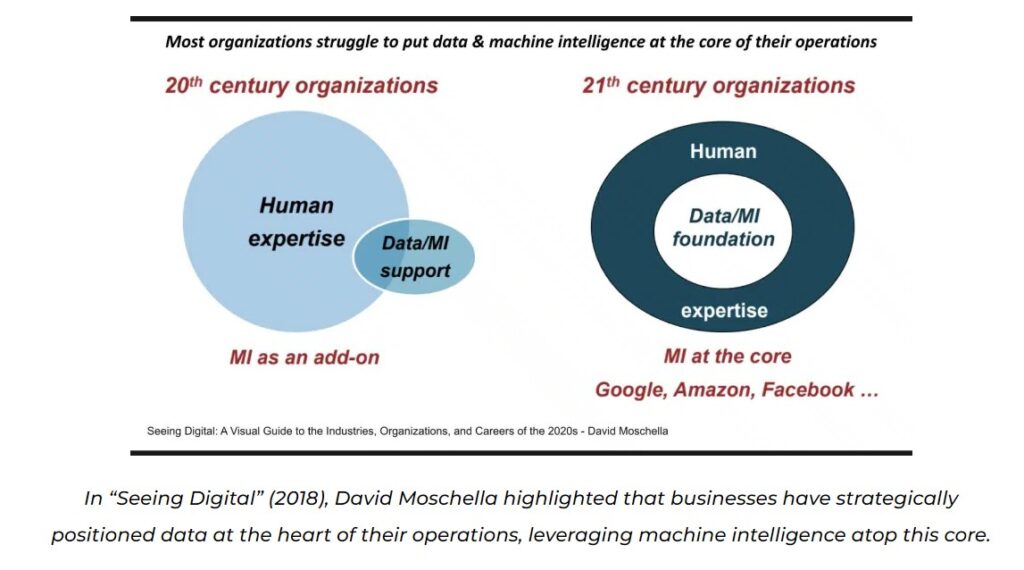
This article is sponsored and originally appeared on Ascend.io.
In recent years, the data space has transformed significantly. Advanced tools and platforms are now taking away the cumbersome tasks of managing outdated architectures and intricate codebases. This change, often referred to as “moving up the stack,” has pushed data teams from behind-the-scenes roles to the forefront of business strategy and decision-making.
With more businesses leaning on data to guide decisions and enhance products, there’s a growing demand for experts who are both technically skilled and have a sharp focus on value delivery. This article introduces you to the Data Automation Engineer — a pivotal role in today’s data-driven world.
We’ll delve into what a Data Automation Engineer is and what their day-to-day looks like, explore why companies are eager to hire them, highlight how they differ from other data professionals, and offer insights on how to identify this talent.
What Is a Data Automation Engineer?
A Data Automation Engineer is a data professional who harnesses data pipeline automation software, transcending routine and cumbersome challenges associated with data pipelines to emphasize high-impact outcomes.
We intentionally defined them as “data professionals” because this role isn’t confined to data engineers, analytics engineers, or technical data analysts. The key criterion is their ability to deliver impactful data products.
Their expertise is not based on piecing together a data stack or chasing the latest tech trend (often dubbed as “resume-driven architecture“). Instead, their true merit lies in maximizing impacts and steering tangible outcomes for their organization with respect to data.
A Glimpse Into the Day-to-Day: The Workflow of a Data Automation Engineer
To further understand the role of a Data Automation Engineer, let’s look at their workflow and how they ensure data is primed and ready for business application.
At the heart of a Data Automation Engineer’s role is the design, implementation, and maintenance of data pipelines. These pipelines streamline the flow of data, transforming it from raw, unprocessed information into a refined and actionable data product.
The overarching mission of a Data Automation Engineer revolves around a singular, pivotal objective: delivering data products efficiently and rapidly to fortify business operations. They wield intelligent automation software to ensure that every step in the pipeline is built for peak efficiency.
- Data Ingestion: The start of the data pipeline involves validating data sources in the data ingestion step — ensuring that they’re consistent and reliable. With the use of automation, engineers orchestrate periodic audits, confirming that the data aligns with organizational benchmarks.
- Transformation Process: As data progresses through the pipeline, it undergoes significant refinement in the data transformation step. Engineers meticulously clean and structure this data to transform it into a format that’s ripe for generating actionable insights.
- Quality Assurance: Within the pipeline, checkpoints are essential. Engineers incorporate automated tests and checks at every step, safeguarding against inaccuracies and catching quality failures along the way — instead of waiting for the pipeline to run completely.
- Operational Stability: The pipeline isn’t just about moving data; it’s about ensuring that data flows uninterrupted and is ready for delivery. Engineers make certain that the underlying code functions flawlessly in production environments. Regular monitoring and prompt troubleshooting ensure the integrity of the pipeline.
Having structured and refined data through the pipeline, the Data Automation Engineer then delivers the data product. This isn’t just about processing data; it’s about crafting a tangible asset that businesses can leverage.
But what might be more enlightening is what Data Automation Engineers are freed from:
- Managing Change: One of the biggest advantages for Data Automation Engineers is the diminished need for extensive impact analysis when data or code changes occur. Advanced automation tools automatically ensure that any change gets consistently applied across the ecosystem without the engineer’s manual intervention. This not only saves time but significantly reduces the risk of errors that can arise from manual change management.
- Building a Data Platform: Their focus remains steadfast on extracting and delivering value from data. They aren’t sidetracked with building an extensive data platform that will become outdated. They understand that in the rapidly advancing world of data technology, platforms can quickly become relics, whereas the insights derived from data remain timeless.
- Routine Maintenance: While they set up and oversee data pipelines, they aren’t burdened with the daily grind of routine maintenance. Advanced systems, alerts, and automation handle many of these tasks, allowing the engineer to invest time in strategic and value-driven tasks.
Why Are Companies Hiring Data Automation Engineers?
As business growth and technology continue to evolve together, Data Automation Engineers are becoming increasingly essential. Companies today prioritize adaptability, speed, and precision. Let’s delve deeper into why companies are keenly seeking Data Automation Engineers:
Historical Context
The idea of “moving up the stack” in technology is not a novel concept. Historically, each evolution in tech has involved abstracting away the underlying complexities, allowing professionals to focus on higher-level tasks. In the early days of computing, programmers had to engage with the very hardware they were coding for. Over time, layers of software abstracted these complexities, enabling developers to build applications without needing to know the intricacies of the machine’s operations. This shift has pushed data teams from behind-the-scenes to the forefront.

The Pitfall of Resume-Driven Architecture
Every evolution brings its own set of challenges. As tech has grown, so has the lure of resume-driven architectures. It’s where developers embrace certain technologies primarily for their cool factor. Organizations, in turn, become ensnared in a web of intricate systems known to only a select few, hampering innovation and limiting the available talent pool.
James Watters, SVP of products at Pivotal Software, Inc., chimed in on this topic during an interview with theCube. Reflecting on the significance of human capital in the equation, he remarked, “That technical talent is so scarce, and so we have a very simple argument. You can have your smartest people figuring out how to configure operating systems, or you can have them shipping code. Like, what’s going to drive your business?”
The irony here is palpable. Developers, once at the forefront of innovation, risk becoming relics, chained to obsolete architectures. Their fear? That new, streamlined systems might diminish their unique value. But clinging to complexity for the sake of job security is ultimately detrimental to organizational growth.
Productivity Is the New Currency
Today, data isn’t a mere asset; it’s the lifeblood of businesses. However, the mechanics of handling data have become standardized. What sets companies apart is their ability to rapidly transform this data into actionable insights or products. This is the playground of the Data Automation Engineer.
Their role is not just about managing data, but doing so efficiently, flexibly, and in a way that empowers the entire organization. They streamline processes, enhance adaptability, and ensure that the business isn’t tethered to any one developer or antiquated system. In essence, they’re the catalysts, ensuring that businesses extract the maximum value from their data in the shortest time.
Key Advantages of Data Automation Engineers
Beyond just their skills and the systems they manage, Data Automation Engineers’ impact reverberates throughout an organization, enhancing its overall effectiveness. Here’s a closer look at the unique advantages these specialists bring to the table:
Efficiency and Scalability
- The Challenge: The digital age has ushered in a torrent of data. With this deluge, handling it manually or through outdated systems becomes not just inefficient but virtually impossible.
- The Solution: Data Automation Engineers are adept at handling systems that can efficiently process vast amounts of data. Through intelligent data automation, they ensure that as the volume of data grows, the systems scale up smoothly, maintaining optimal performance and minimizing bottlenecks.
Error Reduction
- The Challenge: Human intervention, especially in repetitive tasks, is prone to errors. Inaccurate data can lead to misguided business decisions, with potentially significant consequences.
- The Solution: Through rigorous automated processes and checks, Data Automation Engineers reduce the scope of human errors. This leads to a more reliable set of data that businesses can trust as the foundation for their strategic choices.
Decision-Making on Turbo Mode
- The Challenge: In an ever-competitive market, waiting for insights can be detrimental. Decision-makers need fast, actionable data to stay ahead.
- The Solution: With automation, data processes are expedited. This acceleration ensures that decision-makers have access to the insights they need, almost in real-time, empowering them to make informed decisions rapidly, thus giving businesses a competitive edge.
Prepped for the Future
- The Challenge: The realm of data technology is in constant flux, with new innovations and methodologies emerging regularly.
- The Solution: By integrating automation today and employing Data Automation Engineers, companies are not just responding to current needs. They’re future-proofing. These professionals ensure that systems are modular and adaptable, ready to incorporate future advancements in data technology.
Interviewing for Data Automation Engineering Potential
Pinpointing someone with “data automation engineer” as a title on their resume is unlikely. Job titles in this realm can be misleading due to the rapidly changing nature of the industry. Therefore, when you’re hiring for this role, you’re primarily recruiting for potential rather than experience. It’s essential to look beyond the gloss of titles and instead, focus on an individual’s capabilities and intrinsic qualities.
1. Outcomes Over Resume Building
Ideal candidates prioritize tangible business results over mere technical accomplishments. They’re not solely invested in ramping up their resume or crafting a sprawling data platform as a stepping stone for promotion. Their eyes are firmly set on harnessing data to propel business outcomes. Their decisions aren’t driven by the allure of the latest technologies or the desire to embellish their resumes but by a commitment to the organization’s mission and objectives.
Examples of interview questions to evaluate this quality:
How do you determine the success of a data project? What metrics or indicators do you typically consider?
- Have you ever been faced with a situation where a project you were proud of from a technical perspective didn’t deliver the expected business outcomes? How did you handle it?
2. Technical Proficiency Aligned With Business Impact
While Data Automation Engineers indeed lean on automation to amplify their productivity, they are, at their core, technical. For instance, they are proficient in languages like Python and SQL. However, these skills are truly catalyzed when paired with a genuine understanding of the business impact that data can drive.
Examples of interview questions to evaluate this quality:
- How do you ensure that your projects stay aligned with the evolving goals of the business?
- Describe a time when you had to translate complex technical information to non-technical stakeholders. How did you ensure they understood its business implications?
3. Insatiable Curiosity and Continuous Learning
It’s unlikely you’ll encounter candidates with expertise spanning every facet of the job. Instead, seek out individuals with a voracious appetite for learning. Those who demonstrate an enthusiasm for continuous growth and have a track record of learning new skills or tools on the fly will be invaluable assets.
Examples of interview questions to evaluate this quality:
- Can you share an example of a project where you had to step out of your comfort zone and learn something completely new on the job? How did you approach it?
- When was the last time you learned something new at work? What sparked the drive to explore it?
The Power and Promise of Data Automation Engineers
As businesses recognize the necessity to move beyond merely collecting data to effectively harnessing it, Data Automation Engineer emerge as the vital bridge between vast data resources and actionable business strategies.
Their value isn’t merely in their technical prowess but in their approach to their role — one that prioritizes continuous learning, efficiency, adaptability, and a profound understanding of both the data realm and business impact. As organizations continue to venture deeper into data-driven operations, the need for such holistic professionals will only intensify.
Jon Osborn is Field CTO at Ascend.io.





